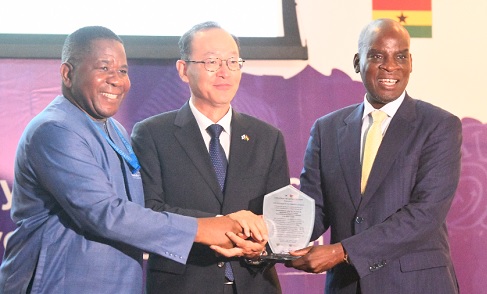Phase II of a special project intended to steadily get girls interested in science, technology, engineering and mathematics (STEM) is expected to begin next year and continue until 2032.
This follows the successful completion of Phase I of the project rolled out over a five-year period and initiated by the Republic of Korea through the Korea International Cooperation Agency (KOICA), in collaboration with the Ministry of Education (MoE) and the Ghana Education Service (GES).
The $8.39 million project, dubbed “Enhancing girls’ competency in mathematics and science , was implemented through gender-responsive pedagogy in junior high schools (JHS) in the country.
It was implemented across 400 JHSs in 10 districts in the Eastern and Central regions, directly impacting over 49,000 students and training 800 mathematics and science teachers, 400 head teachers and 68 School Improvement Support Officers (SISOs).
Over the five-year period (2021 to 2025), the STEM Phase I Project introduced teacher learning circles (TLCs), a bi-weekly, subject-specific collaborative platform designed for teachers of the same subject area, particularly mathematics and science.
These TLCs created safe and supportive spaces for peer learning, experience sharing, and practical problem-solving, allowing teachers to reflect on their own teaching and learning directly from their colleagues.
The TLCs became a cornerstone of the project’s professional development II approach, contributing significantly to the improved performance of both teachers and students.
The project also included targeted support for students through after-school classes and Math & Science camps, designed to deepen learning and build confidence among girls.
Furthermore, KOICA provided over $1.5 million worth of teaching and learning materials to equip JHS classrooms with essential science and mathematics resources.
Phase 2
The Phase II would be implemented with a total budget increase from $8.5 million to $28 million.
The Ambassador of the Republic of Korea to Ghana, Kyongsig Park, who announced this, said the second phase would expand to include the Ashanti Region, covering around 800 schools and 1,600 teachers nationwide.
He further gave the assurance that there would be an introduction of digital learning in mathematics and science through tablets and smart classrooms, helping students to learn in ways that reflected the future.
Digital learning hub
Mr Park pledged his government’s support for the establishment of a national hub for digital learning, innovation and teacher training .
He commended the Ministry of Education and the GES, all teachers and students for their dedication, commitment and support for the completion of the project.
The Ambassador noted that over the past years, the project had worked with hundreds of JHSs across the Eastern and Central regions, reaching tens and thousands of students and teachers.
Critical intervention
The Minister of Education, Haruna Iddrisu, commended the Korean Government and KOICA for their continuous support for the development of a critical area towards maths and science education.
"If we are to succeed in developing critical minds, analytical skills and to drive a technological and a competitive changing world, then maths and science ought to be emphasised," he stressed.

